高二英语模块6第二单元语法 动词时态与语态 牛津英语
文档属性
| 名称 | 高二英语模块6第二单元语法 动词时态与语态 牛津英语 |

|
|
| 格式 | zip | ||
| 文件大小 | 94.3KB | ||
| 资源类型 | 教案 | ||
| 版本资源 | 牛津译林版 | ||
| 科目 | 英语 | ||
| 更新时间 | 2013-12-19 21:11:33 | ||
图片预览

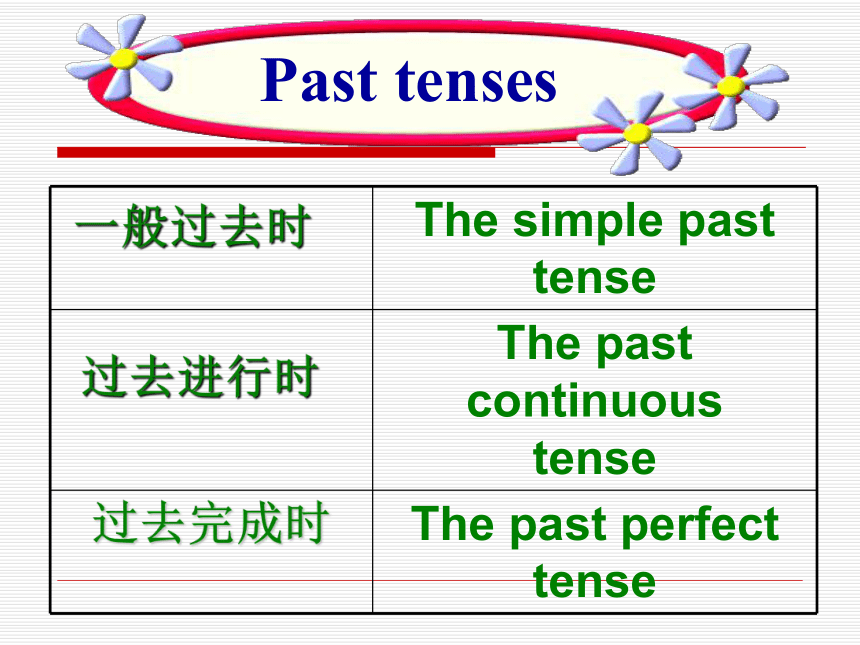
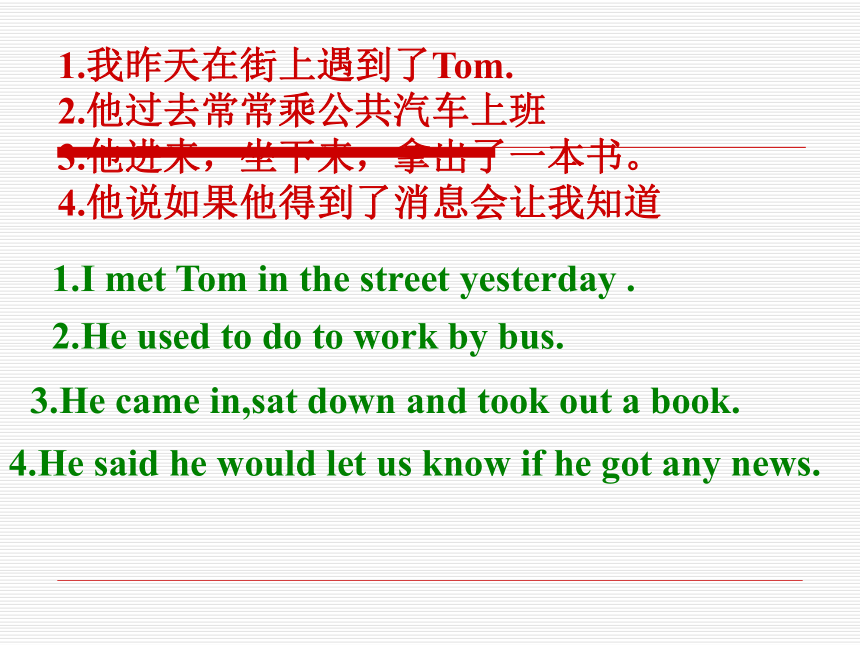
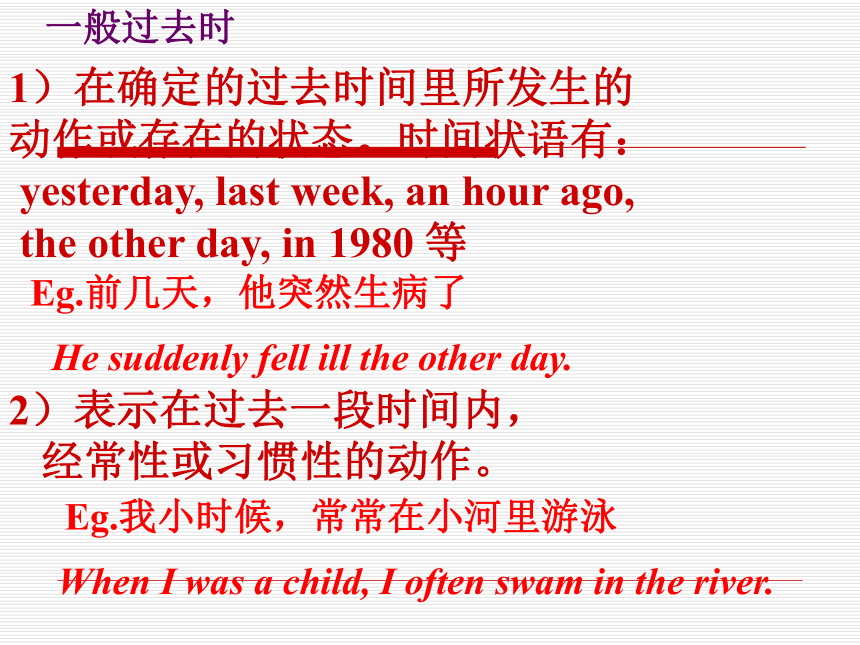

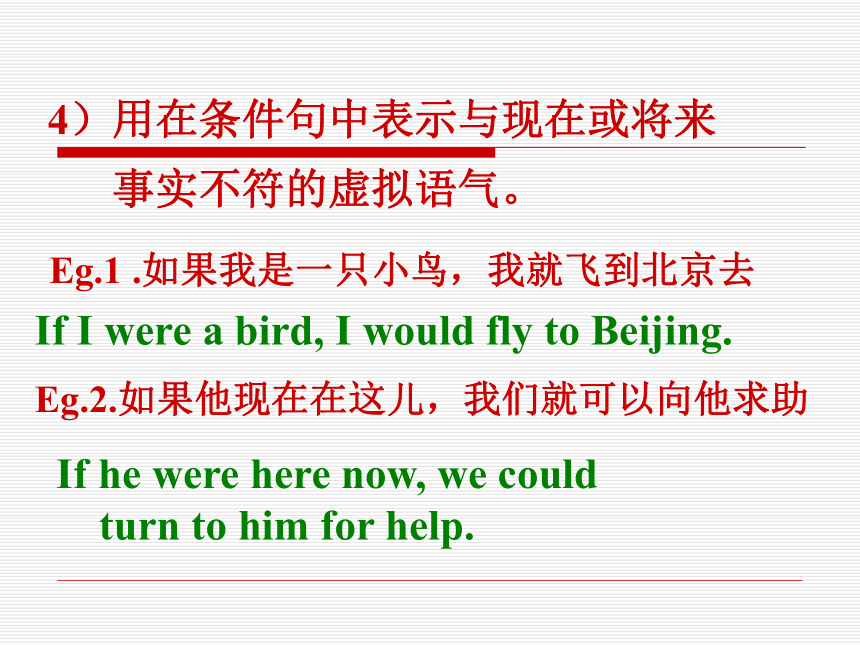
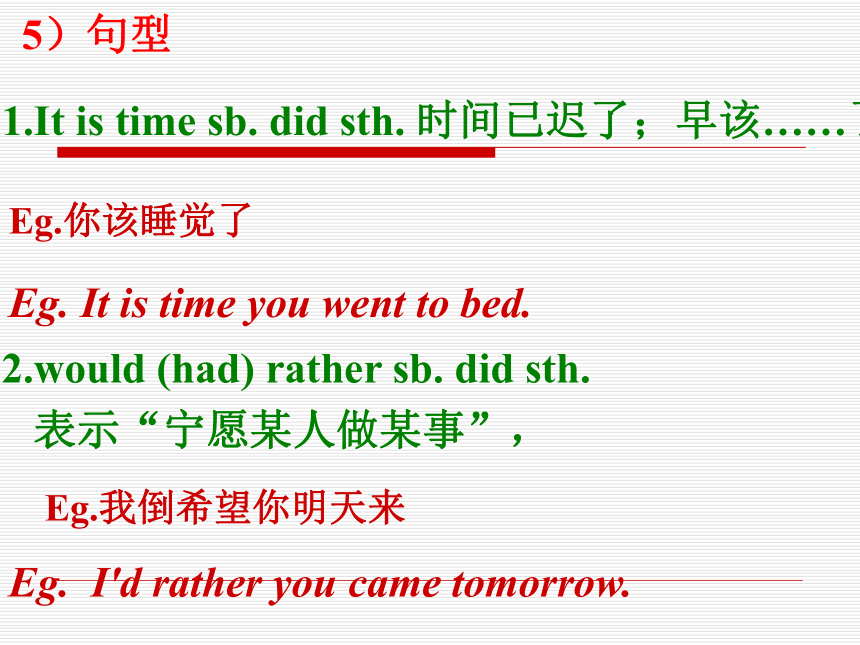
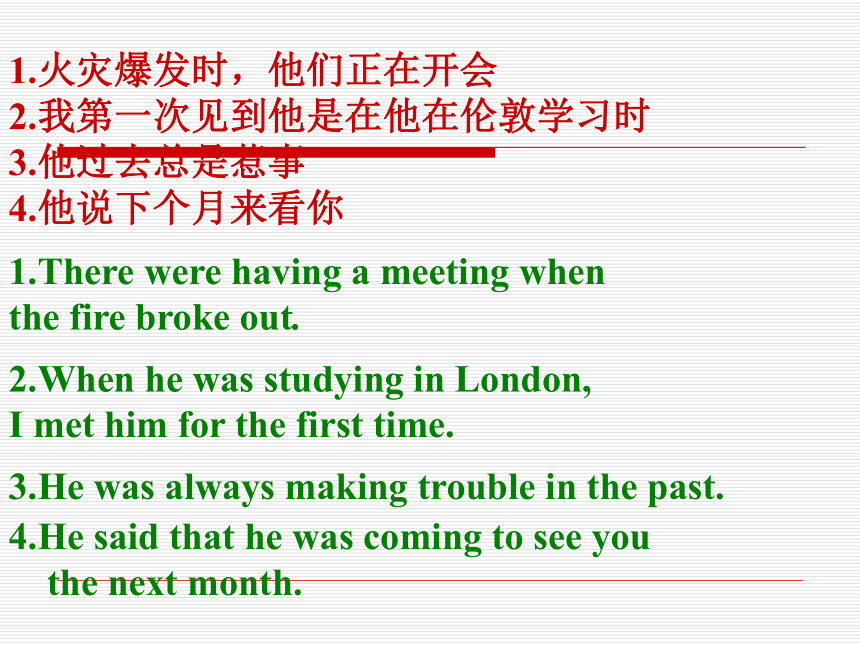
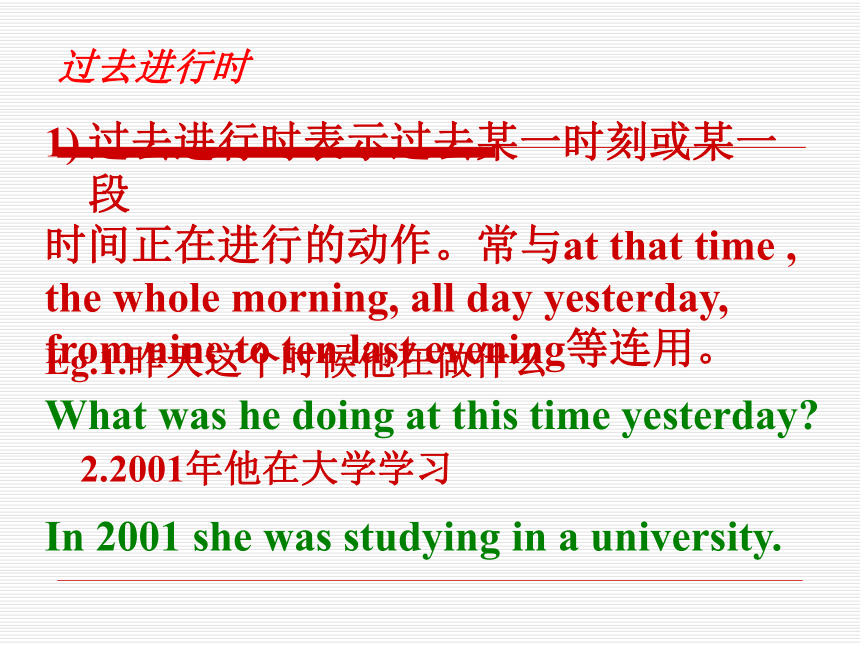
文档简介
课件24张PPT。 Grammar and usagePast and future tenses -----张家港常青藤实验中学 李彬Past tenses一般过去时过去进行时1.我昨天在街上遇到了Tom.
2.他过去常常乘公共汽车上班
3.他进来,坐下来,拿出了一本书。
4.他说如果他得到了消息会让我知道1.I met Tom in the street yesterday .2.He used to do to work by bus.3.He came in,sat down and took out a book.4.He said he would let us know if he got any news.1)在确定的过去时间里所发生的
动作或存在的状态。时间状语有:
yesterday, last week, an hour ago,
the other day, in 1980 等2)表示在过去一段时间内,
经常性或习惯性的动作。Eg.前几天,他突然生病了He suddenly fell ill the other day. Eg.我小时候,常常在小河里游泳When I was a child, I often swam in the river.一般过去时3)用过去时表示现在,表示语气委婉礼貌。
( 1.)动词want, hope, wonder, think, intend 等。
( 2. )情态动词 could, would,Eg. Did you want anything else?
I wondered if you could help me.Eg. Could you lend me your bike?4)用在条件句中表示与现在或将来
事实不符的虚拟语气。
Eg.1 .如果我是一只小鸟,我就飞到北京去If I were a bird, I would fly to Beijing.Eg.2.如果他现在在这儿,我们就可以向他求助 If he were here now, we could
turn to him for help. 1.It is time sb. did sth. 时间已迟了;早该……了,
2.would (had) rather sb. did sth.
表示“宁愿某人做某事”,Eg. It is time you went to bed.Eg.你该睡觉了Eg. I'd rather you came tomorrow.Eg.我倒希望你明天来5)句型1.火灾爆发时,他们正在开会
2.我第一次见到他是在他在伦敦学习时
3.他过去总是惹事
4.他说下个月来看你1.There were having a meeting when
the fire broke out.2.When he was studying in London,
I met him for the first time.3.He was always making trouble in the past.4.He said that he was coming to see you
the next month.过去进行时表示过去某一时刻或某一段
时间正在进行的动作。常与at that time ,
the whole morning, all day yesterday,
from nine to ten last evening等连用。Eg.1.昨天这个时候他在做什么What was he doing at this time yesterday?In 2001 she was studying in a university.2.2001年他在大学学习过去进行时2.)过去进行时的主要用法是描述一件事
发生的背景;一个长动作发生的时候,另
一个短动作发生。It was raining when they left the station.Eg.1. 我兄弟骑车时摔倒了而且受伤了 My brother fell while he was riding
his bicycle and hurt himself.2.他们离开车站时正在下雨3)位置,方向移动的动词用
过去进行时表示过去将来时Eg.没有人知道她是否愿意和我们一起去Nobody knew whether she was going with us.1.当我到车站时,火车已经离开了
2.他告诉我他从未去过北京
3.到上过学期结束的时候,我们已经
学习了2000个单词1.When I arrived at the station, the train had left.2.He told me he had never been to Beijing.3.We had learned 2000 words
by the end of last term.1)过去完成时表示过去某一时刻或者某一
动作之前完成的动作或状态;句中常用
by, before, until, when等词引导的时间状语。过去完成时Eg.1.到去年年底,我们已经造了五幢房子By the end of last year we had built five new houses2. 我进大学前,已经学了5000个单词I had learnt 5000 words
before I entered the university.2)过去完成时的动词还可以表示过去
某一时刻之前发生的动作或者状态持续
到过去某个时间或者持续下去。Eg.1.他睡觉以前,已经连续工作了12个小时Before he slept, he had worked for 12 hours.(3)在过去不同时间发生的两个动作中,
发生在先,用过去完成时;发生在后,
用一般过去时。Eg.1. 当警察到时,小偷已经跑掉了When the police arrived, the thieves had run away4)表示意向的动词,如hope, wish, expect, think,
intend, mean, suppose等,用过去完成时表示
"原本…,未能…"Eg.1.我们本希望你会来,但是你没有We had hoped that you would come, but you didn't.Future tenses1.你长大后打算做什么?
2.他明年30岁
3.我正打算外出,天开始下雨了1.What are you going to do when you grow up?2.He will be thirty years old next year.3.I am about to go out when it to rain. 一般将来时1) shall用于第一人称,常被will 所代替。
will 在陈述句中用于各人称,在征求意见
常用于第二人称。Eg.1.我应该先读哪一段?Which paragraph shall I read first?2.你今晚7点在家吗?Will you be at home at seven this evening?2) be going to +不定式,表示将来。
a. 主语的意图,即将做某事或打算做某事。b. 计划,安排要发生的事。c. 有迹象要发生的事Eg.1你明天打算做什么?
2这个戏剧将在下个月上演
3看乌云,可能有暴风雨了1. What are you going to do tomorrow?2. The play is going to be produced next month.3. Look at the dark clouds; there is going to
be a storm3) be +不定式表将来,
a) 按计划或正式安排将发生的事;
b) (表命令,禁止)应该…Eg.1.我们将在下周六讨论这个报告We are to discuss the report next Saturday.2.没有人可以离开,没有警察的许可No one is to leave without the police’s
permission.4) be about to do…(when),
be on the point of doing…(when)
正要做…(突然)Eg.1.他马上要去北京He is about to leave for Beijing.注意:be about to 不能与tomorrow, next week等
表示明确将来时的时间状语连用。2.我正要上床睡觉,这时电话突然响了I am about to go to bed when the telephone ring.be going to / will的用法之比较:用于条件句时,be going to表将来,
will表意愿。 例:1.If you are going to make a journey,
you'd better get ready for it as soon as possible.
2.Now if you will take off your clothes,
we will fit the new clothes on you in front
of the mirror.be to和be going to 的用法之比较:
be to 表示客观安排或受人指示而做某事。
be going to 表示主观的打算或计划。Eg.I am to play football tomorrow afternoon.(客观安排)I'm going to play football tomorrow afternoon(主观安排)1.他说不久将来看望我们
2.他们说他们下周打算去野餐
3.我们正要打电话给你,你来了1.They said they would drop in on us before long.2.They said they were going to have a
picnic next week.3.We were on the point of calling you
when you came.
2.他过去常常乘公共汽车上班
3.他进来,坐下来,拿出了一本书。
4.他说如果他得到了消息会让我知道1.I met Tom in the street yesterday .2.He used to do to work by bus.3.He came in,sat down and took out a book.4.He said he would let us know if he got any news.1)在确定的过去时间里所发生的
动作或存在的状态。时间状语有:
yesterday, last week, an hour ago,
the other day, in 1980 等2)表示在过去一段时间内,
经常性或习惯性的动作。Eg.前几天,他突然生病了He suddenly fell ill the other day. Eg.我小时候,常常在小河里游泳When I was a child, I often swam in the river.一般过去时3)用过去时表示现在,表示语气委婉礼貌。
( 1.)动词want, hope, wonder, think, intend 等。
( 2. )情态动词 could, would,Eg. Did you want anything else?
I wondered if you could help me.Eg. Could you lend me your bike?4)用在条件句中表示与现在或将来
事实不符的虚拟语气。
Eg.1 .如果我是一只小鸟,我就飞到北京去If I were a bird, I would fly to Beijing.Eg.2.如果他现在在这儿,我们就可以向他求助 If he were here now, we could
turn to him for help. 1.It is time sb. did sth. 时间已迟了;早该……了,
2.would (had) rather sb. did sth.
表示“宁愿某人做某事”,Eg. It is time you went to bed.Eg.你该睡觉了Eg. I'd rather you came tomorrow.Eg.我倒希望你明天来5)句型1.火灾爆发时,他们正在开会
2.我第一次见到他是在他在伦敦学习时
3.他过去总是惹事
4.他说下个月来看你1.There were having a meeting when
the fire broke out.2.When he was studying in London,
I met him for the first time.3.He was always making trouble in the past.4.He said that he was coming to see you
the next month.过去进行时表示过去某一时刻或某一段
时间正在进行的动作。常与at that time ,
the whole morning, all day yesterday,
from nine to ten last evening等连用。Eg.1.昨天这个时候他在做什么What was he doing at this time yesterday?In 2001 she was studying in a university.2.2001年他在大学学习过去进行时2.)过去进行时的主要用法是描述一件事
发生的背景;一个长动作发生的时候,另
一个短动作发生。It was raining when they left the station.Eg.1. 我兄弟骑车时摔倒了而且受伤了 My brother fell while he was riding
his bicycle and hurt himself.2.他们离开车站时正在下雨3)位置,方向移动的动词用
过去进行时表示过去将来时Eg.没有人知道她是否愿意和我们一起去Nobody knew whether she was going with us.1.当我到车站时,火车已经离开了
2.他告诉我他从未去过北京
3.到上过学期结束的时候,我们已经
学习了2000个单词1.When I arrived at the station, the train had left.2.He told me he had never been to Beijing.3.We had learned 2000 words
by the end of last term.1)过去完成时表示过去某一时刻或者某一
动作之前完成的动作或状态;句中常用
by, before, until, when等词引导的时间状语。过去完成时Eg.1.到去年年底,我们已经造了五幢房子By the end of last year we had built five new houses2. 我进大学前,已经学了5000个单词I had learnt 5000 words
before I entered the university.2)过去完成时的动词还可以表示过去
某一时刻之前发生的动作或者状态持续
到过去某个时间或者持续下去。Eg.1.他睡觉以前,已经连续工作了12个小时Before he slept, he had worked for 12 hours.(3)在过去不同时间发生的两个动作中,
发生在先,用过去完成时;发生在后,
用一般过去时。Eg.1. 当警察到时,小偷已经跑掉了When the police arrived, the thieves had run away4)表示意向的动词,如hope, wish, expect, think,
intend, mean, suppose等,用过去完成时表示
"原本…,未能…"Eg.1.我们本希望你会来,但是你没有We had hoped that you would come, but you didn't.Future tenses1.你长大后打算做什么?
2.他明年30岁
3.我正打算外出,天开始下雨了1.What are you going to do when you grow up?2.He will be thirty years old next year.3.I am about to go out when it to rain. 一般将来时1) shall用于第一人称,常被will 所代替。
will 在陈述句中用于各人称,在征求意见
常用于第二人称。Eg.1.我应该先读哪一段?Which paragraph shall I read first?2.你今晚7点在家吗?Will you be at home at seven this evening?2) be going to +不定式,表示将来。
a. 主语的意图,即将做某事或打算做某事。b. 计划,安排要发生的事。c. 有迹象要发生的事Eg.1你明天打算做什么?
2这个戏剧将在下个月上演
3看乌云,可能有暴风雨了1. What are you going to do tomorrow?2. The play is going to be produced next month.3. Look at the dark clouds; there is going to
be a storm3) be +不定式表将来,
a) 按计划或正式安排将发生的事;
b) (表命令,禁止)应该…Eg.1.我们将在下周六讨论这个报告We are to discuss the report next Saturday.2.没有人可以离开,没有警察的许可No one is to leave without the police’s
permission.4) be about to do…(when),
be on the point of doing…(when)
正要做…(突然)Eg.1.他马上要去北京He is about to leave for Beijing.注意:be about to 不能与tomorrow, next week等
表示明确将来时的时间状语连用。2.我正要上床睡觉,这时电话突然响了I am about to go to bed when the telephone ring.be going to / will的用法之比较:用于条件句时,be going to表将来,
will表意愿。 例:1.If you are going to make a journey,
you'd better get ready for it as soon as possible.
2.Now if you will take off your clothes,
we will fit the new clothes on you in front
of the mirror.be to和be going to 的用法之比较:
be to 表示客观安排或受人指示而做某事。
be going to 表示主观的打算或计划。Eg.I am to play football tomorrow afternoon.(客观安排)I'm going to play football tomorrow afternoon(主观安排)1.他说不久将来看望我们
2.他们说他们下周打算去野餐
3.我们正要打电话给你,你来了1.They said they would drop in on us before long.2.They said they were going to have a
picnic next week.3.We were on the point of calling you
when you came.
同课章节目录
- 名词
- 动词/动词短语
- 一般现在时及其被动式
- 一般过去时及其被动式
- 现在进行时及其被动式
- 过去进行时及其被动式
- 将来进行时及其被动式
- 现在完成时及其被动式
- 过去完成时及其被动式
- 一般将来时及其被动式
- 过去将来时及其被动式
- 现在完成进行时及其被动式
- 将来完成时及其被动式
- 副词
- 介词/介词短语
- 连词/连接词
- 数词/量词
- 冠词
- 形容词
- 非谓语动词
- 句型
- 简单句与并列句
- 复合句
- 主谓一致
- 倒装与省略
- 强调句
- 虚拟语气
- 插入语
- 固定句型
- 祈使句/感叹句
- 疑问句/反义疑问句
- 非限制性定语从句
- 句型转换
- 定语从句
- 表语从句
- 宾语从句
- 主语从句
- 动词时态与语态
- 虚拟语气与情态动词
- 主谓一致
- 独立主格结构、with的复合结构
- 情态动词
- 状语从句
- 定语从句
- 特殊句式
- 交际用语
- 代词/不定代词
- 名词性从句
- 同位语从句
- 表语从句
- 宾语从句
- 主语从句
- 直接引语和间接引语
- 构词法(word formation)
